Love Sonnets
Introduction
How do young women take agency of their own storytelling? When sitting behind the table in a hierarchal rehearsal room is no longer enough, what could a more conversational and curious rehearsal process look like? This series will investigate these questions and expand on the process of creating Love Sonnets: Things Women Say, a staged reading developed under Emerson College's Mercutio Troupe.
When I first envisioned crafting Love Sonnets, it was a late night response to too much caffeine, an imagined feminine-utopia-theatre-space-fever-dream, and a desperate exploration through Chuck Mee’s statements on developing work. On his website, I found the following quote:
“I think of these appropriated texts as historical documents—as evidence of who and how we are and what we do. And I think of the characters who speak these texts as characters like the rest of us: people through whom the culture speaks, often without the speakers knowing it.”
As a young theatremaker, it’s always been hard for me to nail down the balance between making art and affecting impact. When do we as artists sacrifice a political agenda for the sake of making something universally palatable? Is that sacrifice ever necessary, and should it be? And how can we reimagine our ideas of theatre in order to unpack these questions? In particular, I’ve been considering how we tell women’s stories onstage, and the extent to which women’s voices and aesthetics of thinking, communicating, and being are translated to larger forms of storytelling. While equitable hiring and casting practice are everything—and I mean everything—that give me hope for my favorite medium of storytelling, I also wonder how we can reimagine the traditional theatre model to reflect this equitability across the form.
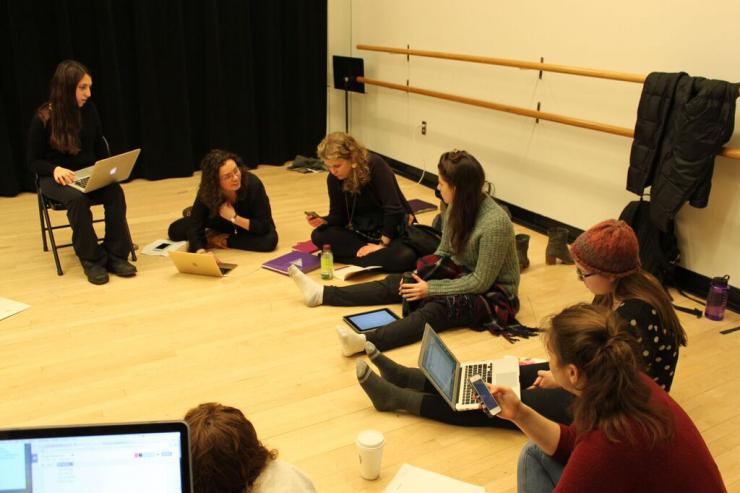
From this midnight scavenging of the Internet came Chuck Mee’s call to deconstruct and reconstruct his work. From that call came Love Sonnets: Things Women Say, a pseudo-devised staged reading combining already-written monologues from Chuck Mee’s body of work, and original poems from our ensemble members. We performed these pieces in the Huret and Spector Art Gallery on Emerson College’s campus, and created a zine to accompany our rehearsal and development process. Throughout this process, my goal was to project women to the forefront: not only was our ensemble—my girl gang, as I came to call them after about three seconds in their brilliant presence—composed entirely of women, but our process circulated around how women communicate. How could we effectively construct a space for women to speak like themselves for themselves?
A phrase I centralized throughout this rehearsal process was “brave space,” a term coined by Brian Arao and Kristi Clemens in an article they wrote for The Art of Effective Facilitation. Distinct from the concept of a safe space, brave space invites all present to share and engage without fear or distrust, invoking gentle conflict as an element necessary to growth and learning. The brave space that my remarkable Love Sonnets ensemble built allowed us to discuss fears and questions relating to Chuck Mee’s monologues, and dig in our heels to move beyond the questioning and discussing phase of the process to the reading, writing, and doing. While our first two rehearsals were spent entrenched in debate, dialogue, and stop-and-start work, we quickly sprang from these debates into a community of focus, decision-making, and forward momentum. Armed with a group-edited Google Doc script, we collectively copied, pasted, tweaked, nudged, and diced my preliminary script until we felt that every woman in the room could find her voice and footing within Mee’s vast, mythically emotional, and passionate poems.
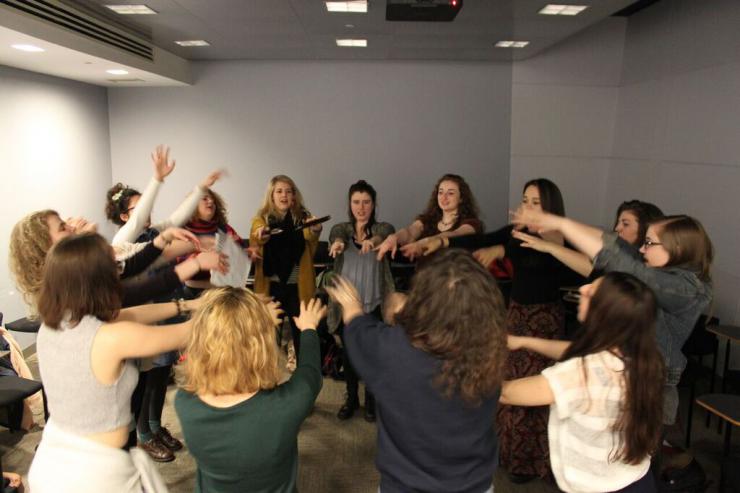
On the night of our first performance, we positioned the ensemble in a half-moon curve in a corner of the art gallery. Behind them were two video monitors on which we cycled pictures of the rehearsal process and cast portraits from Shrine Day, a day in the process dedicated to collective sharing and affirming physical objects representative of womanhood for each ensemble member. On two sides, we lined up rows of chairs and benches around the cast. Surrounded by twinkling lavender Christmas lights and seated barefoot on the floor, the ensemble looked and sounded intimate. Scripts in hand they stood to speak, paced around their fellow cast members, proclaimed deep love and rejection to the audience, and confided in the cast, inviting the audience to listen from afar. I was captivated by the idea of bedroom culture, of circles of friends telling secrets to each other at slumber parties after their parents went to bed; I wanted to bring this level of empathy to a wider audience, ask the audience to narrow their focus and extend generosity when presented with vulnerability. Through this vulnerable presentation and empathetic reception, Love Sonnets’ talking circle came to life for two nights in a cozy, over-heated art gallery full of enormously giving audience members, and then was gone.
In our Love Sonnets talking circle, I found myself so deeply moved as I watched the audience crowd the art gallery, kneeling and leaning against walls, and standing in corners to listen to our ensemble speak to each other about navigating through womanhood and the world.
Then, our final performance felt like a thoroughly feminine gathering. Throughout the dramaturgical process we were drawn to the idea of matriarchal talking circles, communities within which women sat facing each other and democratically resolved conflicts and addressed concerns. In our Love Sonnets talking circle, I found myself so deeply moved as I watched the audience crowd the art gallery, kneeling and leaning against walls, and standing in corners to listen to our ensemble speak to each other about navigating through womanhood and the world. After the performance, a male friend of mine approached me and said, “You got rid of the traditional, steeped-in-patriarchy, theatrical format and created a women’s space onstage.” This is the most complimentary response to my work I have ever received.
This process taught me a couple lessons. The first lesson that Love Sonnets taught me is that not everything can be about everything all the time. There are a thousand and one discussions on race, ability, sexuality, and class that this project was unable to encompass. And it’s my deepest desire that those topics will continue to be elevated and expanded upon in my future work, and the work of others. My second lesson was an affirmation of what I already knew to be true—I love women so, so much. As a queer woman and a woman whose feelings live on the surface of everything I do, this has been a well-known truth my whole life. Yet, I have never felt as affirmed as I did sitting in a circle of women listening to their ideas expressed so bravely.
While I would be content to live surrounded and uplifted by women for the rest of my life, my true hope is that feminine spaces and spaces that celebrate womanhood can extend to work created by artists of every gender identity. I am deeply proud to be an emotional, empathetic, and weepy woman, but I don’t believe that making art grounded in compassion should be the sole responsibility of women. Instead, I hope the experience of crafting art non-hierarchically and bravely and warmly can feel as radical for artists of all backgrounds as it did for my Love Sonnets girl gang.

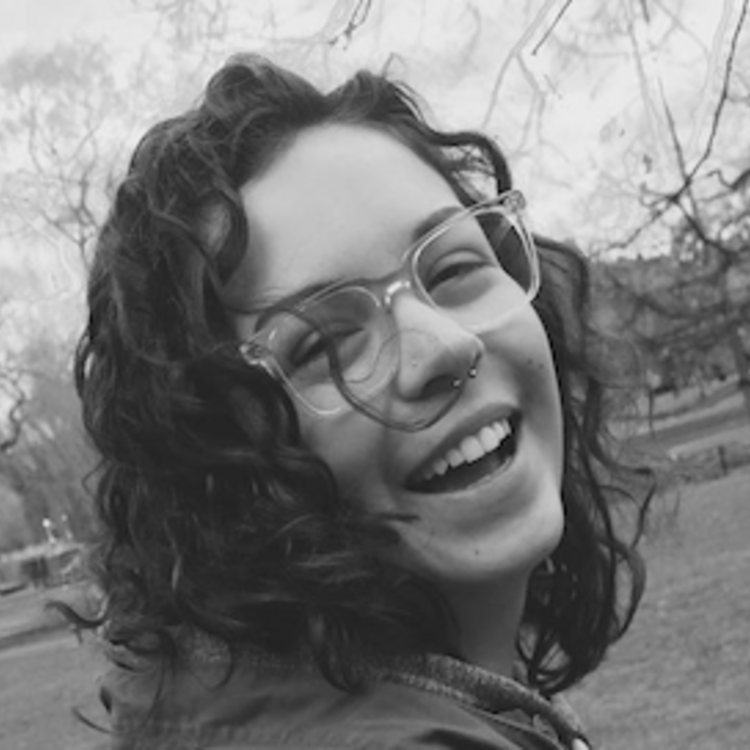
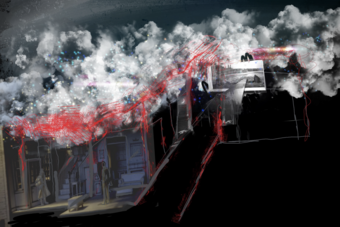



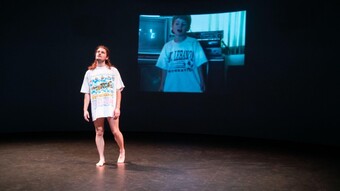



Comments
The article is just the start of the conversation—we want to know what you think about this subject, too! HowlRound is a space for knowledge-sharing, and we welcome spirited, thoughtful, and on-topic dialogue. Find our full comments policy here